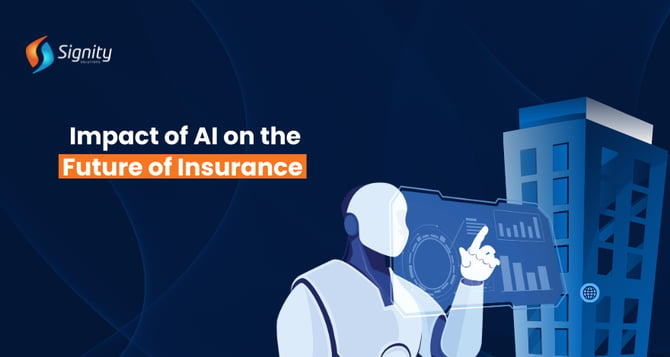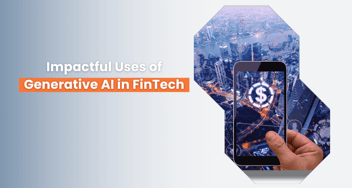The Impact of AI on the Future of Insurance
AI is transforming the insurance industry by enhancing risk assessment, automating claims, and personalizing customer experiences. It improves fraud detection, enables dynamic pricing, and offers proactive solutions. While revolutionizing efficiency and personalization, ethical considerations and transparency remain crucial for shaping the future of insurance.

Artificial Intelligence (AI) is revolutionizing industries worldwide, and the insurance sector is no exception. With its ability to analyze data, automate processes, and improve decision-making, AI in the insurance industry is set to transform how insurers operate and deliver services to their customers. Here, we explore the profound impact AI will have on the future of insurance.
Enhanced Risk Assessment and Underwriting
One of the most significant applications of AI in the insurance industry is in risk assessment and underwriting. Traditional underwriting processes often rely on historical data and manual evaluations. AI, on the other hand, uses predictive analytics and machine learning models to assess risks more accurately and efficiently. By analyzing vast datasets, including real-time information, insurers can make informed decisions and offer personalized policies. This precision minimizes risks for insurers while ensuring customers receive fair and tailored coverage.
Streamlined Claims Processing
Claims processing is a critical yet time-intensive aspect of insurance. AI simplifies this process by automating claim verification, fraud detection, and payouts. For instance, AI-powered chatbots can guide customers through the claims process, while algorithms assess the legitimacy of claims within minutes. This not only reduces operational costs but also enhances customer satisfaction by speeding up settlements. Additionally, AI tools can analyze damage from uploaded images or videos, further streamlining the claims process.
Improved Customer Experience
The integration of AI in the insurance industry is revolutionizing customer interactions. AI-driven tools like chatbots and virtual assistants provide 24/7 support, addressing customer queries and offering tailored policy recommendations. Furthermore, AI enables insurers to anticipate customer needs by analyzing behavior and preferences, leading to a more personalized and seamless experience. This is a critical component of the future of insurance, as customers increasingly demand convenience and customized services.
Fraud Detection and Prevention
Insurance fraud is a significant challenge for the industry, costing billions annually. AI combats this issue by analyzing patterns and anomalies in claims data to detect fraudulent activities. Machine learning models continuously improve over time, becoming more adept at identifying red flags and reducing false positives. This ensures that genuine claims are processed without unnecessary delays while protecting insurers from financial losses. Fraud prevention powered by AI is a game-changer for the future of insurance.
Dynamic Pricing Models
AI enables insurers to adopt dynamic pricing models by analyzing customer-specific data such as driving habits, health records, and lifestyle choices. For example, telematics in car insurance uses AI to monitor driving behavior, allowing insurers to offer personalized premiums based on risk levels. This shift toward usage-based pricing ensures fairness and encourages safer behavior. In health insurance, wearable devices integrated with AI can track fitness levels, helping insurers incentivize healthier lifestyles with lower premiums.
Predictive Analytics for Proactive Solutions
Predictive analytics, powered by AI, allows insurers to anticipate potential risks and offer proactive solutions. For instance, health insurers can use AI to identify customers at risk of chronic diseases and provide preventive care recommendations. Similarly, property insurers can analyze weather data to alert policyholders about potential hazards, minimizing damage and claims. These proactive measures define the future of insurance, where prevention becomes as important as protection.
Revolutionizing Policy Management
AI streamlines policy management by automating routine tasks such as renewals, endorsements, and policy cancellations. Chatbots and automated systems can notify customers about upcoming renewals, suggest coverage adjustments based on changing needs, and even handle mid-term changes to policies. This automation reduces the administrative burden on insurers and enhances the customer experience.
Challenges and Ethical Considerations
While the benefits of AI in the insurance industry are undeniable, there are challenges and ethical considerations to address. Ensuring data privacy, eliminating algorithmic bias, and maintaining transparency in AI-driven decisions are crucial for building trust with customers. Regulatory compliance will also play a pivotal role in shaping the adoption of AI technologies. Insurers must balance innovation with ethical responsibility to create sustainable solutions.
The Road Ahead
The future of insurance is undeniably intertwined with AI. As technology advances, insurers that embrace AI will gain a competitive edge by offering innovative products, improving efficiency, and enhancing customer satisfaction.
The Insurance Revolution Starts Here
Step into the future of insurance! Discover how AI is reshaping policies, streamlining claims, and delivering personalized experiences like never before.
However, the successful implementation of AI will require a strategic approach focusing on ethical practices, customer-centricity, and continuous learning.
In conclusion, AI in the insurance industry is not just a technological trend but a transformative force that will reshape the industry. By leveraging AI’s capabilities, insurers can create a more efficient, personalized, and resilient ecosystem, ensuring they remain relevant in a rapidly changing world.













